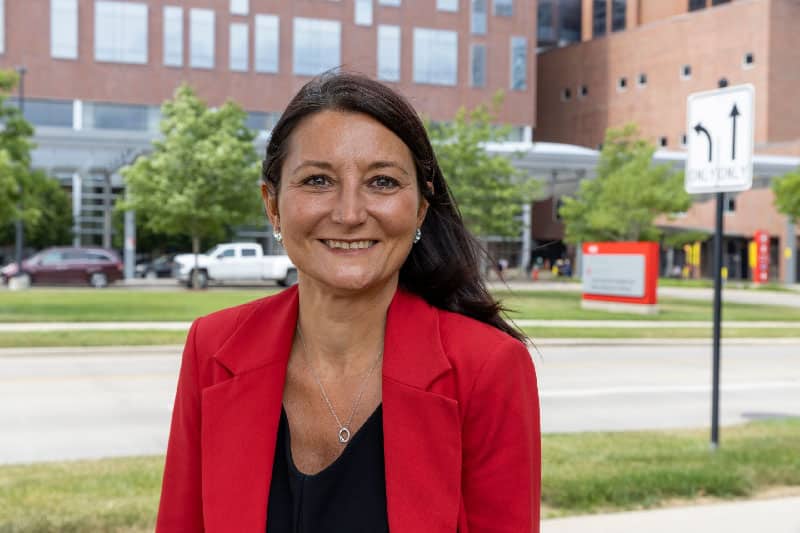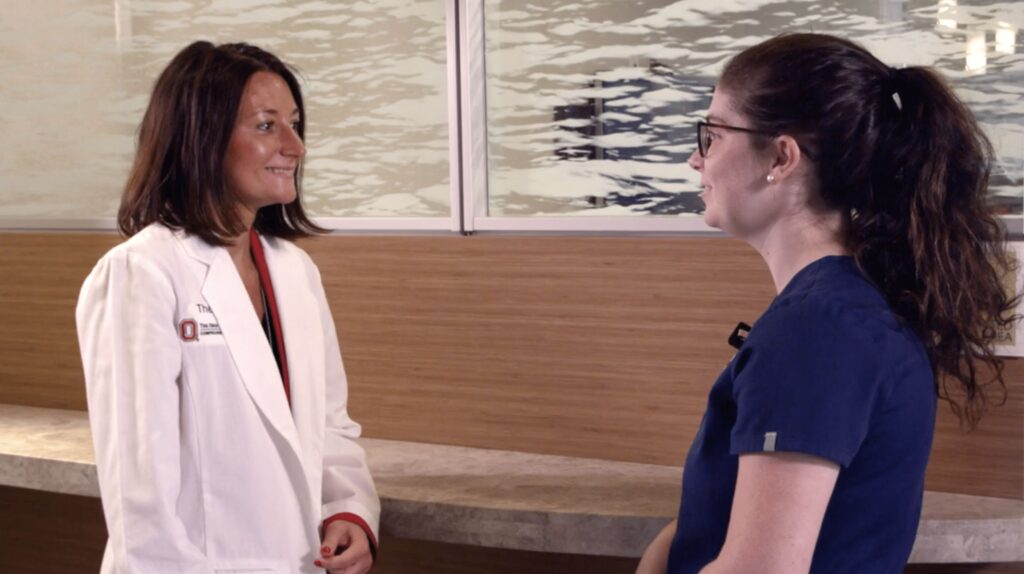The Healing Power of Compassion

When someone is diagnosed with a disease such as lymphoma, the relationship between a patient and their doctor is crucial. It is not only the cornerstone to their care, but also has a critical impact on their mindset and often even their long-term outcome. For Kami Maddocks, MD of the Ohio State University Comprehensive Cancer Center, the bonds she creates with her patients go far beyond the call of duty of a doctor and are the most rewarding aspect of her work.
DREAMS OF BECOMING A DOCTOR
Born and raised in South Dakota, Dr. Maddocks always had her sights set on becoming a doctor. “My parents say that as a little girl I always said I would become a doctor when I grew up,” says Dr. Maddocks. As a young child, she had dreams of becoming an OBGYN and delivering babies, but her interests changed drastically during her first year of medical school. “I was attending a biochemistry lecture about genes and tumor suppressor genes, and I found the science so fascinating,” says Dr. Maddocks. “Following the lecture, I went back to my apartment with my roommate and said, ‘I just cannot believe that everybody would not want to be an oncologist, this stuff is so interesting.’”
My parents say that as a little girl I always said I would become a doctor when I grew up.
With a newfound passion for oncology, Dr. Maddocks decided she wanted to pursue a career in hematology, and inspired by several mentors she ultimately chose to focus on lymphoma and chronic lymphocytic leukemia (CLL). “I would watch my mentors in medical school and during my residency develop such amazing relationships with their patients,” says Dr. Maddocks. “I immediately knew I wanted to help make an impact on patient’s lives through the care I could provide them and be a part of developing research that could help change the future for those diagnosed with lymphoma.”
Upon completing her residency in internal medicine at the Mayo Clinic in Rochester, Minnesota, Dr. Maddocks moved to Ohio for her fellowship in hematology-oncology at the Ohio State University Comprehensive Cancer Center. After her fellowship, she was offered a permanent position on the hematology team where she continues to work. Dr. Maddocks is currently an Associate Professor of Clinical Internal Medicine in the Division of Hematology at The Ohio State University. As a clinical oncologist, she works as a hematologist specializing in treating patients with B-cell malignancies and researches new therapies largely through evaluating new targeted therapies in clinical trials.

MOTIVATED BY PATIENTS
One of Dr. Maddocks’ favorite parts about being a clinical oncologist is that each day is different and offers new challenges. “I see patients two days a week, read through research, collaborate with others, write protocols, enroll patients in clinical trials, and examine data,” says Dr. Maddocks. “My job is both exciting and rewarding, and the best part is making an impact on my patients’ lives.” The relationships Dr. Maddocks forms with her patients not only mean everything to her but motivates her to help move research forward. “In many cases, I develop long-term relationships with my patients and they become like family to me,” says Dr. Maddocks. “I am grateful for the opportunity to watch them grow, their families grow, and see them experience life after lymphoma.”
I immediately knew I wanted to help make an impact on patients’ lives through the care I could provide them and be a part of developing research that could help change the future for those diagnosed with lymphoma.
Dr. Maddocks believes research is the most impactful way to help improve the lives of those diagnosed with blood cancer. Her goal is to find ways for her and her colleagues to improve patients’ quality of life through existing treatments, as well as examine new treatments that have the biggest potential to cure patients in the long run. “I often see patients with aggressive forms of lymphoma such as mantle cell lymphoma (MCL) and diffuse large B cell lymphoma (DLBCL), who as a result, can often present very sick,” says Dr. Maddocks. “When you treat them and they get better it is a very satisfying feeling, but for those patients who do not respond as well to treatment, it challenges us as doctors to make it better and find new ways to treat them.”
Dr. Maddocks feels being a researcher has an invaluable effect on her work as a physician. “I think it keeps me more open-minded and always challenging,” says Dr. Maddocks. She says the rapid pace of scientific discovery not only motivates her to continue to do better for her patients but allows her to provide hope to her patients who may be struggling. “A lymphoma diagnosis can be extremely overwhelming but sharing information about potential new treatments with my patients offers them comfort and allows them to have a better outlook on their journey ahead.”
EVOLVING TREATMENT LANDSCAPE
Currently, Dr. Maddocks’ clinical research involves her serving as an investigator on several clinical trials in lymphoma, most of which are evaluating non-chemotherapeutic and targeted approaches to the treatment of lymphoma. “As science advances and we learn more about lymphoma, we discover more about how to target lymphoma instead of using traditional chemotherapy which is meant to attack everything,” says Dr. Maddocks. “The whole point of undergoing treatment is to be able to live a life after lymphoma and many novel therapies not only offer patients the ability to live longer, but they are better tolerated, and they improve patient’s quality of life both now and in the future.”
Her recent clinical trials are looking at mantle cell lymphoma in both frontline and relapsed settings and are investigating the use of targeted therapies for treatment. Dr. Maddock is also testing tailoring therapy based on minimal residual disease. “Our goal is to treat patients with the best and most effective therapies by targeting their responses without the risk of over-treating them,” she says.
Due to the tremendous progress in the field of lymphoma research, Dr. Maddocks sees much promise for the future of her patients but also knows that there is far more work to be done. She believes that this can be achieved through a better understanding of the disease and a greater investment in lymphoma research and the scientists who move the needle forward. Dr. Maddocks says that research programs, such as the Lymphoma Research Foundation’s (LRF), help to foster vital relationships between researchers and give them the tools they need to advance cures.
THE LRF EFFECT
In 2014, Dr. Maddocks received an LRF Clinical Investigator Career Development Award (CDA) (a grant awarded to advanced fellows or junior faculty members to facilitate their transition to independent clinical researchers). She says that the award was critical to her career and getting her research off the ground. “The grant allowed me to have protected time to conduct my research and was a huge turning point in my career,” says Dr. Maddocks. Since then, Dr. Maddocks served as a speaker at several LRF patient education programs, served as faculty for LRF’s Lymphoma Scientific Research Mentoring Program (LSRMP), and is currently serves as co-chair of the LSRMP alongside Scientific Advisory Board members Ari Melnick, MD (Weill Cornell Medicine), Brian Link, MD (University of Iowa), and Christian Steidl, MD (BC Cancer, Vancouver).
I am grateful for the opportunity to watch them [my patients] grow, their families grow, and see them experience life after lymphoma.
She is excited by the opportunity to pay it forward by mentoring young investigators through the LSRMP. Dr. Maddocks understands firsthand the role that mentoring can play in a researcher’s career. “As researchers, we face challenges early in our careers and often don’t know where to turn for help,” says Dr. Maddocks. “I think to continue to evolve the science and the research, we need to train and support our early-career scientists who are quite literally the future.” She finds it extremely rewarding to share her experiences with young investigators and to help provide a community to them. “The lymphoma community is so collegial and inclusive, and I think being a part of that early is nice for young investigators because they feel a sense of belonging to that community,” she says.
As co-chair of the LSRMP, Dr. Maddocks hopes to help early-career scientists prepare for careers in lymphoma research and clinical investigation. She is also enthusiastic about the expansion of the program to include a translational track as she sees it as a synergistic approach. “Combining translational and clinical faculty allows for people to see each other’s perspectives and really understand what drives research from a lab to the clinic,” says Dr. Maddocks.
Most importantly, Dr. Maddocks receives a great amount of hope from being a part of LRF’s research programs and says it reinvigorates her. “I think it renews my interest in what I’m doing and gets me excited to see what these young investigators can do for the future of lymphoma research.
Read More Articles from Pulse
Pulse is a publication of the Lymphoma Research Foundation, providing the latest updates on the Foundation and its focus on lymphoma and chronic lymphocytic leukemia (CLL) research, awareness, and education
